The Banker and the Bulldog
Decisions, decisions...
Welcome to the second part of Sizing Up Canada’s Next PM, our assessment of Prime Minister Mark Carney in the lead-up to his taking the reins from Justin Trudeau. Today we’re looking at his challenger, Pierre Poilievre, and comparing the two on a number of dimensions.
When we published that, on March 7th, betting markets gave Carney a 35% win probability in the upcoming election. Today, they give him 78%.
There’s no denying that Trudeau’s exit and Trump’s combative overtures have been a combined megathrust earthquake in Canadian politics. We’ve never seen a hockey stick polling graph like this:
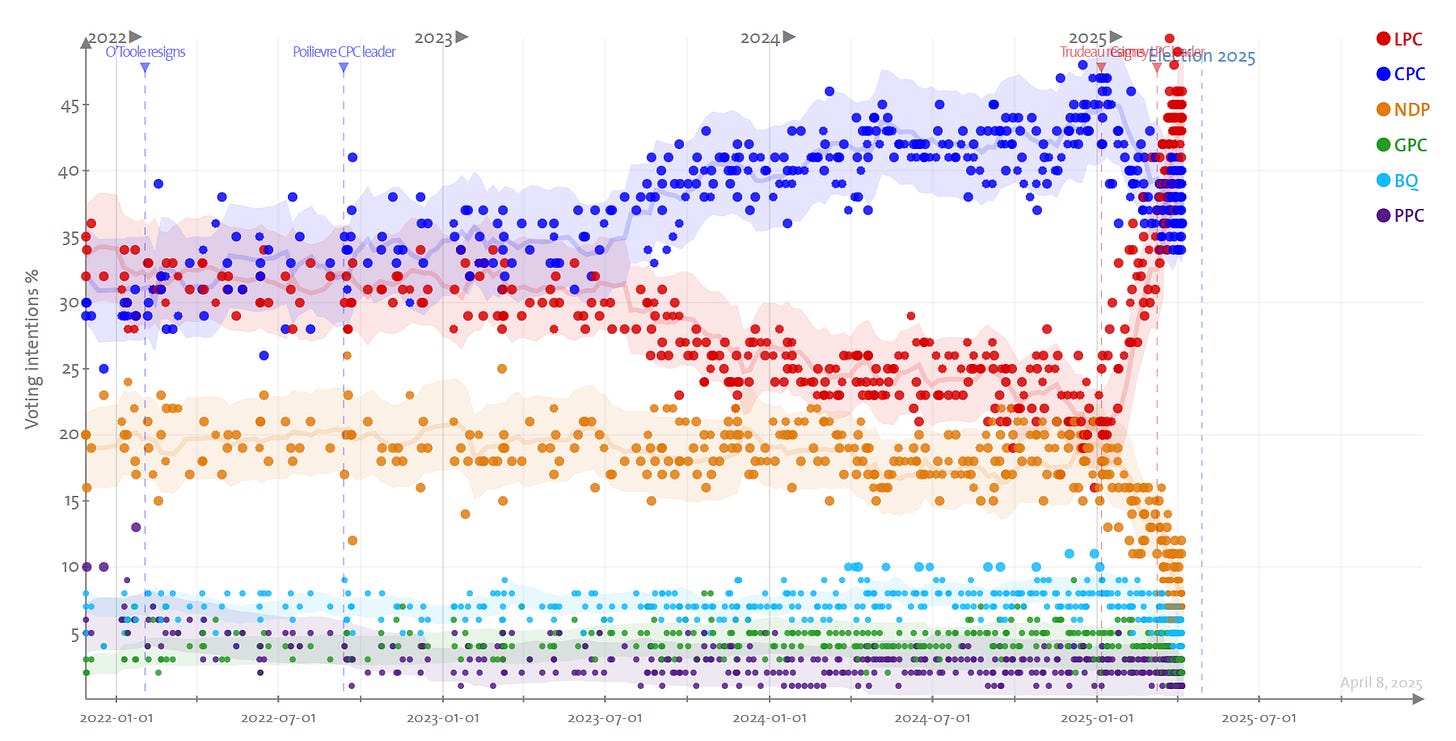
We’re going to give the Conservative leader the same in-depth assessment that Carney got. If current polling comes close to holding, these two are going to combine for the greatest two-party vote share since 1958, so it’s not much worth your time to evaluate the other options.
Why care about this type of analysis? There are alternative interactives like the CBC’s Vote Compass that will help match your personal politics to the closest fit on the ballot. But, while interesting, the set of issues asked about is profoundly out of touch with what is actually going to matter over the next five years. We’re abundance liberals, we believe economic issues are by far the most important ones in play, and we think this is the best analysis out there for those who share such intuitions.
You might disagree with our weights and scores, but hopefully you’ll get a fuller picture of the leader and their vision.
Scorecard: The Bulldog
Key Issues
Housing - YIMBY?
[Score: A | Uncertainty: Low]
“Build the homes!” is the best Conservative slogan in their history, and this line from their website is wonderful:
Whereas local government gatekeepers continue to block home construction in our cities, leaving Canadians with a shortage of homes.
Withholding federal aid from municipalities that don’t ease zoning is aggressive in the best way possible and forcing “cities seeking federal funds” to “pre-approve building permits for high-density housing and employment on all available land surrounding transit stations” is extremely YIMBY.
One question for the Conservatives is how they plan to tackle flagging productivity in construction, which has been in the gutter since the pandemic. Axing sales taxes on new homes will only stimulate demand and is a bad idea which keeps this from being an A+.
Red Tape - What moves will he make toward growth?
[Score: A | Uncertainty: Low]
Poilievre’s pledged to repeal Canada’s environmental assessment law, which adds additional oversight on top of similar provincial laws. That’s good. Indigenous groups that own land should have a veto point, but there’s not much reason to give one to Ottawa. We’ll touch on this again in health policy, but he’s promised to standardize licensing for doctors and nurses, and to expedite immigrant credential transfer. Overall, he’s on the ball here and will hopefully go farther than he’s pledged.
Sovereignty - How will he stand up to Trump?
[Score: B | Uncertainty: Low]
Fun fact: Donald Trump doesn’t like Pierre Poilievre. Here’s an excerpt from a recent interview in The Spectator:
Trump: Well, I think [Poilievre’s] biggest problem is he’s not a MAGA guy, you know? I mean, he’s really not he’s not a Trump guy at all.
Interviewer: He’s more of a throwback Republican.
Trump: He’s… different. Make it a big mistake. They all make that mistake. You know. They think they’re going to be the tough guy and they’re going to knock out Trump, and they end up getting the hell beat out of ’em. So I don’t know. I mean, I can’t tell you, Pierre. I just don’t know. I don’t like what he’s saying about me. It’s just not positive about me.
Some people think this is calculated on Trump’s part. I wouldn’t buy that, given the spontaneity of the actual audio (I chopped a long rant off the end of the quote about the “rigged” 2020 election).
Funnily enough, this hurts Poilievre’s credibility on the sovereignty front. Canadians don’t see him as a strong representative at the table with the US, and the leader of the US doesn’t like him.
Ultimately, I think the delta between the different options on sovereignty is small. If Trump’s internal model is Anybody-But-Trudeau (plausible) or Annex-Canada (less likely?), then it’s a wash. However, that doesn’t change the fact that Poilievre lacks domestic legitimacy here, because of his style, his associates, and the general partisan hostility he engenders.
Technology - What is Canada’s role in AI?
[Score: B- | Uncertainty: High]
Poilievre is well-known as a crypto champion and has been roundly lampooned for that position, but I think it demonstrates a willingness to engage with emerging technology. Unfortunately, I’m skeptical it’s a genuinely important technology and he has basically nothing interesting to say about artificial intelligence—by far the largest development of the decade (here he is repeating unfounded slop about ChatGPT’s electricity use). So maybe there’s some attitudinal virtue here—and industry leaders seem optimistic—but that’s about all we’ve got to go on.
Important Issues
Character - Who is he?
[Score: B+ | Uncertainty: Low]
In an embarrassing first year political science essay, I extensively cited this Economist piece that dubbed him “Pierre the pugilist” and argued that his combative style was single-handedly bringing the populist manner into Canadian politics. While I still have a mild-mannered bias, this was a foolish conclusion to draw, given Canada’s long history of populist currents.
There is no career outside of politics to speak of, but the career he has had is about what you’d expect for someone in his position. He is a former cabinet minister with a knack for party discipline (of which Canada has too much) who has come around to the national consensus on closing the abortion and gay marriage debates.
He’s a good orator, but much better in a debate than giving a speech. His French is great, which is always a boon, more so for a Conservative party that has had deeply un-French leaders these past few elections.
For a picture of Poilievre the man, I think back to his party’s leadership debates, where, when asked what he last binge-watched, cited Trotsky and said that “it helped [him] to better understand the diabolical evil of communism and totalitarian socialism.” Yes, there are no personal scandals here, but I sense a lack of humanistic depth as well. That will make it hard to pivot into the role of unifier.
Climate - Are his solutions smart?
[Score: C- | Uncertainty: Low]
“What solutions?” you might be asking. “Axe the tax!” you might be hearing.
Admittedly I am a carbon pricing shill and I’ve found the Conservative campaign vis-a-vis climate to be almost entirely distasteful. With that said, it’s disingenuous to say they don’t have a plan—rather, they don’t like talking about it. The conservative theory of the case is that technological advancement is going to innovate our way out of our problems, and if we intervene, it should be to encourage that outcome.
I don’t think he commits enough to that promise of innovation.
Poilievre wants to expand existing tax credits for businesses that invest in clean energy, tech, and the materials used to build them. He’s nuclear-curious, but I’d like to hear a bigger vision that explicitly incentivizes R&D. That wouldn’t be as efficient as a carbon price, but it would at least attack the research market failure.
Still, this implicit platform is a far cry from 2021’s detailed effort, and seems to be a tacit minimization of the climate as an issue.
Immigration - Will he foster dynamism?
[Score: B | Uncertainty: Low]
Some conservatives are toxically nativist—he is not one of them. Instead, he’s recognized a widespread frustration with housing supply, exacerbated by a rapidly increasing population, and wants to move to tie the latter to the former. Speaking with Jordan Peterson, he correctly noted that there once was a consensus on immigration in Canada, and it was well above the OECD average. If he is honest about going back to those levels, it would still be a reasonably liberal equilibrium.
Industry - How can government intervene efficiently?
[Score: B+ | Uncertainty: Medium]
Poilievre’s instincts are Friedman-like and he seems likely to avoid frivolous spending projects. He has pledged to maintain massive tariffs on Chinese electric vehicles, which are self-defeating and punish Canadians who want cheap cars and Canadians worried about the climate. Other than that though, I don’t foresee many mistakes on this front. What is one way government can intervene efficiently? Not intervening.
Taxation - If more, why?
[Score: B+ | Uncertainty: Medium]
He’s proposed deferring the capital gains tax on profits reinvested in Canada, which should help revive the corpselike domestic investment environment. Other tax cuts (for the low-income) are planned, which will take some budgeting skill to align with his commitment to cut spending in equal proportion to new spending. There’s room to do more in this space, but these are tasteful proposals.
Trade - Can he break Canada’s economic balkanization?
[Score: A | Uncertainty: Low]
Poilievre launched the current interprovincial trade push, which Carney has picked up and run with. That’s fantastic. He’s said he wouldn’t touch supply management—Canada’s price control scheme for dairy, chickens, and eggs—and seems likely to keep that position given the present tensions down south. Yet, if an end to that policy were traded for the restoration of normal US relations, it’s a deal that he should take 10/10 times.
Relevant Issues
China - Support for Taiwan?
[Score: B+ | Uncertainty: Low]
Conservatives are China hawks and that is unlikely to change given the long-running scandal over Beijing’s interference in the 2021 federal election. The US becoming a bully might change the calculus for a Liberal government wishing to establish more strategic autonomy, but I don’t see it coming from this Conservative party—they’ll likely stick with the D.C. consensus. MPs like Michael Chong, who have condemned Chinese policy in Xinjiang, deserve commendation, and the CPC is on the whole more credible on China.
Energy - What is his theory of the case?
[Score: A | Uncertainty: Medium]
What’s nice about a carbon price is that you can unleash your natural resources without any potential climate harms weighing on your conscience—the negative externalities on everyone else are priced-in. In fact, Alberta had the nation’s first such policy, all the way back in 2007. Regardless, though I won’t double-dock Poilievre points on this, as it’s part of the climate dimension, it would have been an easy parry to most critiques with an environmentalist tinge.
There’s a pair of bills he wants to scrap that I think would unambiguously benefit the energy sector and growth. Bill C-69 is an environmental review law that supersedes provincial jurisdiction. As Yglesias has written about the United States, but which is true about Canada too:
… if you want to transform the nation’s energy system, then delay is fundamentally not your friend. The infrastructure for a fossil fuel economy already exists; the infrastructure for a net zero economy does not. Reforming the permitting process to make it easier to build the economy we need is good and important, and it continues to be good and important even if a fair permitting deal also lets some fossil fuel projects go forward.
Bill C-48 is a ban on oil tanker traffic along the west coast, making it more difficult for Alberta to bring its goods to Asian markets.
Some are going to argue that these roadblocks to oil are effective second-best solutions that constrain supply in the absence of policy to constrain demand. I think where we differ is on whether it is worthwhile to sabotage industry in order to achieve uncertain, indirect emissions reductions, at a very high opportunity cost. Pipelines, for instance, are simply a cleaner way of transporting oil than trucks or rail.
This is maybe the easiest area to energize growth rates in the short-run, besides internal trade liberalization, and Poilievre’s policies should deliver on that front.
Healthcare - Will he reform licensing?
[Score: B | Uncertainty: Medium]
There is no rosy story to tell about Canadian Medicare:
In 2022 (the latest year of available data), among high-income universal health-care countries, Canada spent the fourth-highest share of its economy on health care (after adjusting for population age differences between countries). For that world-class level of spending, Canada ranked 28th in the availability of physicians, 25th in hospital beds, 27th in MRI scanners and 28th in CT scanners. And we ranked dead last on wait times for non-emergency surgeries.
Opposition to private experimentation, modeled on success stories in Europe, is more religious than it is reasonable. However, the Conservatives seem cowed on the issue and have given up pushing new ideas.
There is a plan to substantially reform licensing, which should get immigrants with medical credentials into the workforce quickly and make it easier to move around the country to work. Expanding medical schools and shortening time in school are both ideas they should look at adopting, but licensing reform is a great step forward.
NATO - When is Canada going to hit 2%?
[Score: C+ | Uncertainty: Medium]
There’s no timeline to hit 2%. The increases he has promised come at the expense of existing foreign aid programs. I’ve sketched some pro-foreign aid arguments here, and generally view this as a punching-down approach to funding defense.
Ukraine - Will strong support continue?
[Score: A- | Uncertainty: Low]
Poilievre’s statement from earlier this year:
And I want to be completely clear – Conservatives believe that no process for peace negotiations should happen without Ukraine being part of these discussions. Ukrainians have the right to determine their own future.
His party did oppose a Canada-Ukraine trade deal in order to posture about carbon pricing, but I think indications like that recent statement suggest the status quo is likely to be maintained.
Peripheral Issues
Education - Retooling our human capital?
[Score: C+ | Uncertainty: Medium]
Protecting speech on campus is a nice principle to advocate, but some of the specific ideas the Conservatives are proposing are either bad, or using the language of policies which have turned out to be inappropriate tools of control in the U.S. context:
Support a three-year prohibition on embryonic research and ensure the federal government “encourage[s] the granting agencies to focus on more promising adult (post-natal) stem cell research.”
End to the “imposition of woke ideology” in the allocation of federal funds for university research.
Incentivize federal funding to universities that have “implemented the Chicago Principles” to “protect free speech on campus.” Failure to protect free expression “would result in losing federal funding.”
Woke science seems like an incredibly overrated problem! You should probably stop sounding like the person using it as a means to destroy society’s R&D. Like some other policy areas, this is rhetoric to poison the well—which is faith in things like medical science.
Media - Does he have solutions to brainrot?
[Score: C+ | Uncertainty: High]
I think the basic argument for a public broadcaster runs like this:
(1) Knowledge and profit are distinct ends; (2) Profit maximization only contingently maximizes knowledge; (3) Private media maximizes profit; (4) Public media can be forced to prioritize pursuing knowledge over profit; (C) Ergo, public media can fill an epistemic hole.
I also believe that the contingent relationship in (2) has been quite strong for a long time, but is clearly withering. Local news, deep in decline, now relies on public funding more than any point in modern history. For that reason, I think gutting the CBC is bad policy.
Poilievre is against the dumb online cultural protectionism of the Trudeau years, which is both illiberal and has hurt small news publishers that use Google and Facebook.
Unfortunately, like many political leaders, I cannot find any statements reflecting his views of technology’s differential impact on the development of youth. This continues to be among the most pressing problems for believers in human flourishing, as today’s children are more anxious, less social, and less humanistic than any other generation in the last hundred years.
Norms - Is he an institutionalist?
[Score: C+ | Uncertainty: Low]
To bring that old Economist article back up again, I think this passage does a good job distilling why institutional liberals felt justified assailing him as MAGA-lite for so long:
Mr Poilievre, “Skippy” to his colleagues, achieved this by stuffing into a punch-bag hate-figures, institutions and ideas and pummelling it vigorously. They include Mr Trudeau and his “radical woke coalition” with the New Democrats, a left-leaning party that backs Mr Trudeau’s minority government; the central-bank governor, Tiff Macklem, whom he has promised to sack; the World Economic Forum, a network of bigshots who hatch “globalist” plots; and “gatekeepers” such as city officials who block housebuilding. Mr Poilievre dislikes mainstream media and wants to defund the CBC, a public broadcaster.
As far as I can tell, he still wants to interfere with the central bank, though qualitatively, I find the anti-institutional messaging has meaningfully calmed since early 2023. While the rhetoric itself is damaging—eroding trust with no clear payoff—there’s little appetite for a Trump-style war against branches and subbranches of the federal government, and we shouldn’t expect to see that.
Although… in preparing this piece, I was unimpressed to find this ridiculous tidbit from a recent rally:
The crowd cheered loudest at the end, as the leader said he would slow immigration, stop taking down statues, and promised that no one in his family would be allowed near the World Economic Forum.
The Upshot
Weighing the issues by importance, Pierre Poilievre receives a B grade overall, scoring 3.18/4.3. The uncertainty on his score is +/- 0.81, ranging from a strong A- in the best case scenario to a C+ in the worst case.1 He’s strong on housing, red tape, trade, and energy, with rather standard scores for a Conservative across the board.
Head to Head
Now for the main event. The first question to consider is who seems poised to actually win?
Poilievre, who prior to Trudeau’s resignation was riding a >90% chance of victory, now seems direly underpriced. Carney’s at 78% and around 6 points ahead in the polls. The two candidates are going to face off in a pair of debates (one in English, the other French) on April 16 and 17, where there is going to be every attempt to expose the central banker’s political inexperience.
I think conservatives are right to be bullish on Pierre’s debating skills, and he’s gotten copious amounts of practice acting confrontational in the House of Commons. Unfortunately for them, it looks like these debates are going to have to go perfectly—winning back BC and Ontario in the English leg, and making Carney’s French look repugnant to Quebecers in the follow-up. That will be made more difficult by the presence of three(!) other parties on stage, all of which are entitled to equal speaking time.
On the Trump front, Canada did not benefit from the Mad King’s tariff reprieve and is getting hit with 25% on significant sectors. If the president wants a right-wing government up north (which is not at all clear), he is running out of time to get out of the Canadian news cycle. Based on all of the polling available, the Trump issue plays much better for the Liberals:
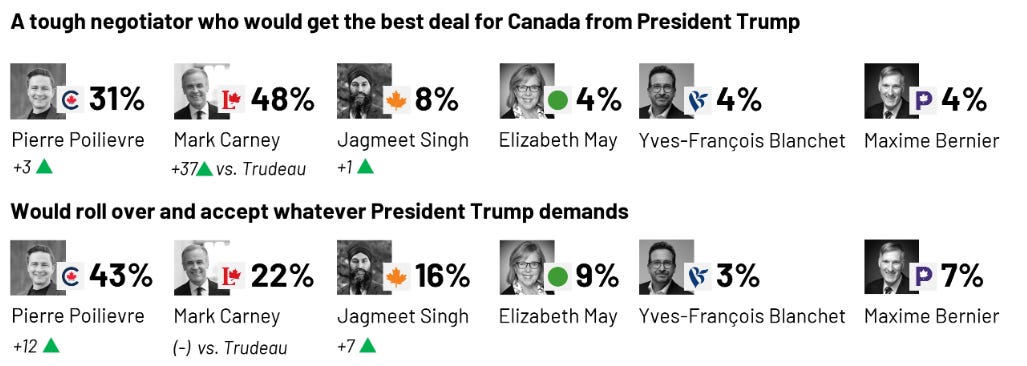
From Carney’s perspective, there’s still uncertainty regarding how large the honeymoon effect is on his poll numbers. Thus far, they have continuously trended upwards. It seems as though they must be at their peak, but the collapse of the NDP (Canada’s labour party) feels irreversible with such little time to go before election day. That leaves the Bloc (Quebec’s nationalists) as the chief third-party threat to the Liberals, and we’ll just have to see how that goes—I’ve got no intuitions.
Given some honeymoon effect wearing off, a decent debate cycle for Poilievre, and a quiet Trump—on the matter of Canada—leading into election day, the odds seem pretty even to me, with a 55-45 edge to Carney.
Turning to the matter of who should win, we’ve gone through all of this effort to arrive at a rather close finish:
Carney wins the Outrageous Fortune endorsement, by narrow margins. The worst case scenario for either, where the uncertainty uniformly breaks badly, is a C+, but Carney edges out Pierre in the best case scenario and in the overall grade.
He does so by winning on technology, sovereignty, and climate, whilst remaining fully competitive on housing, immigration, and trade.
It’s not talked about much, but Carney is an AI guy who has brought the tech up in speeches and in his leadership debate. There’s uncertainty here, but attitudinally he’s basically a techno-optimist when it comes to the potential productivity growth, government applications, and Canadian innovation possibilities that could emerge from the AI space.
The sovereignty issue comes down to projecting strength, and he’s harnessed the sense of purpose from the final days of the Trudeau government on this matter.
In past elections, the most salient argument for favouring the Conservatives ran something like growth promotes well-being, its effects are compounding, and other ends of government don’t have compounding effects, so growth over any decent time horizon trumps other ends in terms of promoting well-being.
But, as I hope has shone through in this post and the last, I don’t believe Carney’s ideas are far behind on the growth front. Indeed, he seems to view it as front and centre.
Here is a visual comparison across each dimension—feel free to argue about any of it in the comments:
Some closing thoughts:
This is not shaping up to be a particularly consequential election, but it is likely to give us a consequential government.
If you’re someone who needs instrumental motivation to go vote, there is little to find here, unless:
You weigh the issues significantly differently from us—maybe you’re not on the abundance train.
You live in a closely contested riding and place high value on a marginally better government (or have some other wacky end, like wanting a minority government).
Long-form interviews are underrated for forming an opinion on a candidate’s personal qualities, you should listen to some.
Carney on Conversations with Tyler (the world’s best interview show)
Carney at Cardus (lower budget, but strong questions about values)
Poilievre on Jordan Peterson (yes, he’s a good interviewer—I would argue this is the only interesting Poilievre long-form that’s available)
Though the weighting system might be refined in the future, the same one has been used here as in the previous analysis.


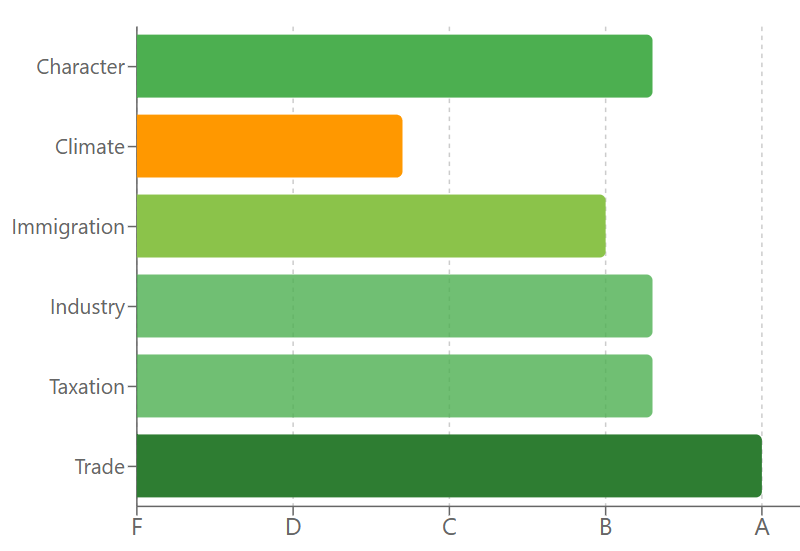


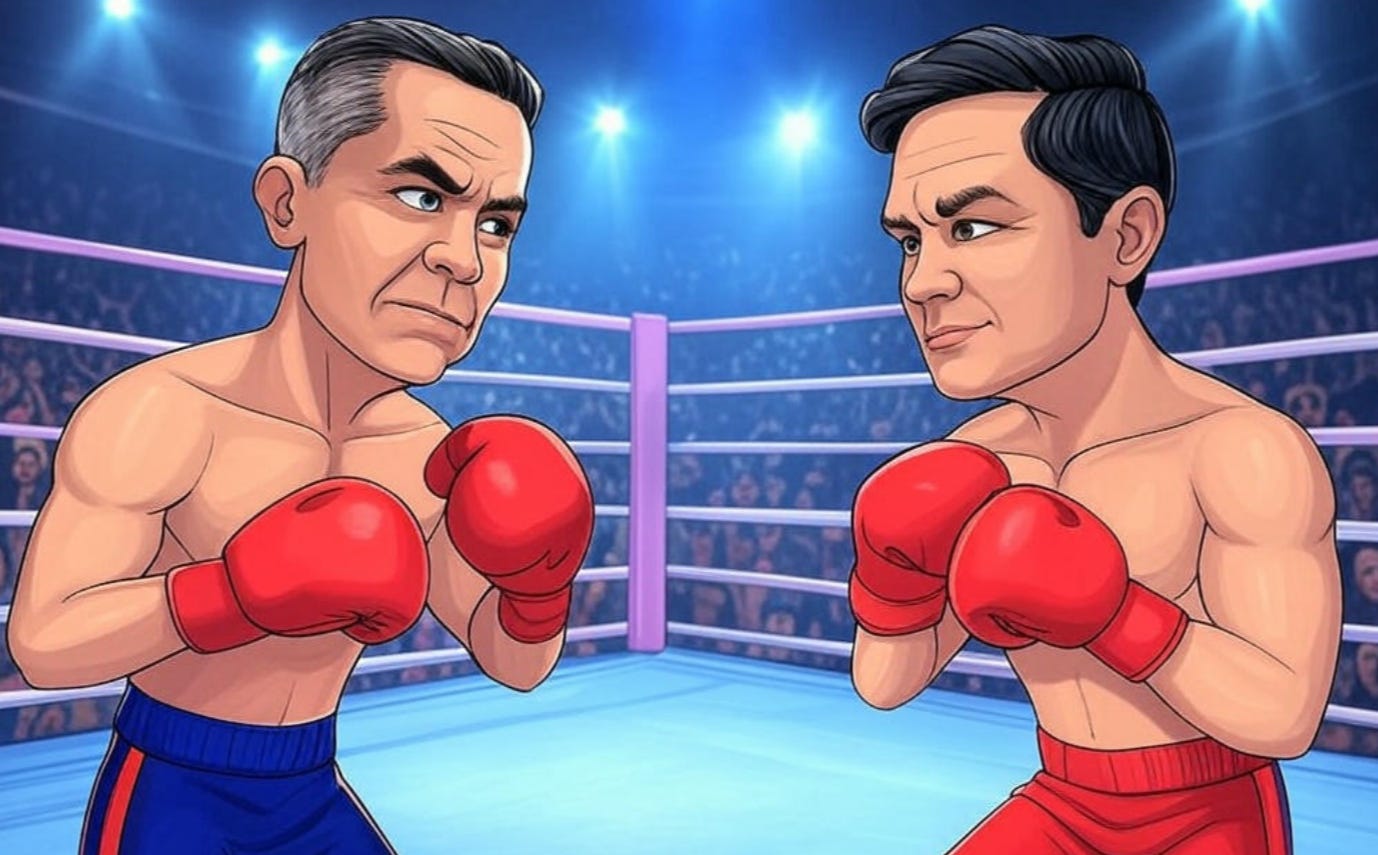
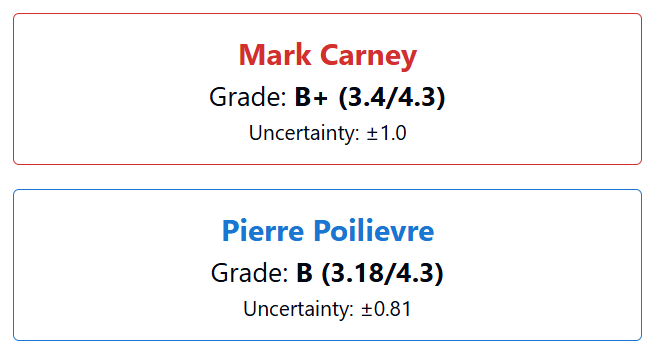
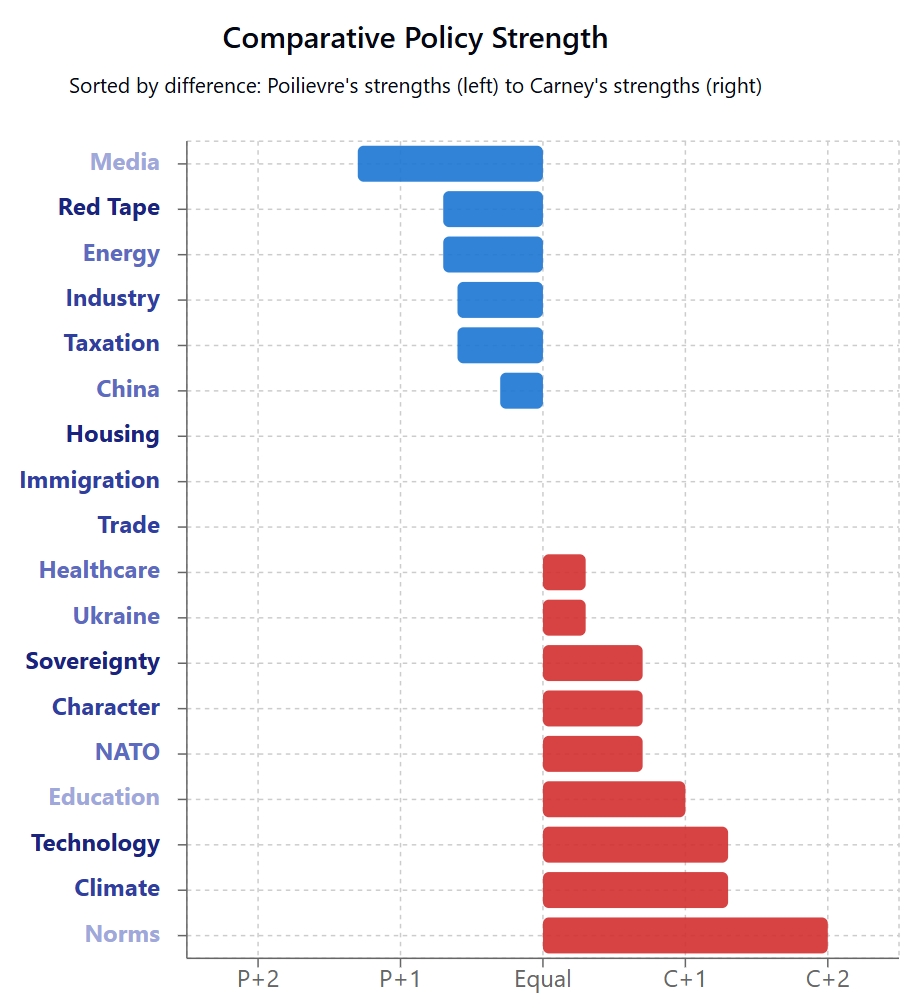
"Axing sales taxes on new homes will only stimulate demand and is a bad idea which keeps this from being an A+."
This isn’t fully accurate, that was my intuitive conclusion as well. But one of the articles I was reading pointed out that this is actually considered a very helpful policy on the supply side because it raises a lot of projects into economic viability. So basically, the discount from the sales tax means the sale price can go up while still having a market, which opens up a lot of projects that developers previously weren’t interested in.
Also I just want to point out that the author of this article is very exclusionary into what he decides to publish. He is resistant to a new medial innovation that may save the government innumerable amounts of money in X-rays and such but refuses to acknowledge it due to perceiving it as looking weird.